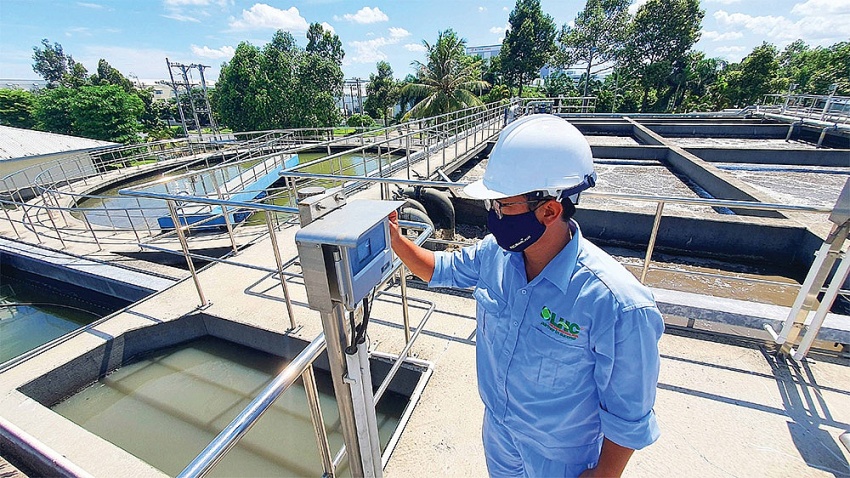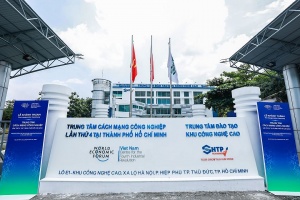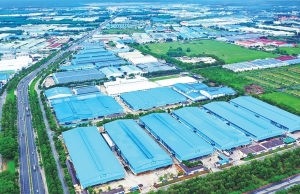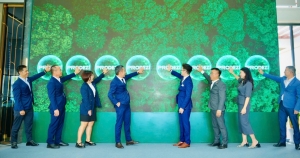Industrial development must go green
About 80-85 per cent of foreign-invested enterprises have high requirements for environmental standards when choosing a factory location, prioritising sustainability factors, according to Savills Hanoi.
 |
| High-tech wastewater treatment systems are a must for industrial parks, Photo: Le Toan |
Thomas Rooney, senior manager of Industrial Real Estate at Savills Hanoi, said environmental, social, and governance (ESG) had become central to businesses, reflecting not only commitment to social responsibility but also influencing long-term sustainable growth. By adopting these standards, companies enhance market reputation.
“ESG also helps companies manage risks better, minimising negative impacts from climate change, environmental disasters, and social unrest, ensuring long-term stability and development,” Rooney said last week.
Globally, investors and businesses in the industrial sector are paying closer attention to sustainability factors, particularly in the growing green industry, which aims to reduce the negative environmental impact. These industrial parks (IPs) are designed to optimise production processes, use renewable energy, and apply advanced technology to minimise ecological harm.
Frasers Property Vietnam, for example, has committed to greening all of its projects’ floor space by 2030, and 85 per cent of their managed and owned projects meeting green criteria. To achieve net-zero emissions, the company has outlined specific plans, including partnering with others to assess carbon emissions and ensuring projects adhere to world-class green standards for sustainable and efficient operation.
Tan Boon Thor, general manager at Frasers Property Vietnam, explained that many customers now only lease properties with green certification.
“In IPs, tenants often inspect whether a building truly meets its green certification standards. Today, companies and tenants alike are seeking green buildings that comply with international benchmarks,” Thor said during a seminar on accelerating the net-zero economy in Ho Chi Minh City in September.
This demand puts pressure on developers to fast-track their implementation of green policies and certifications. However, green transformation is not without its challenges.
Dr. Nguyen Quoc Viet, deputy director of the Vietnam Institute for Economic and Policy Research, highlighted the inadequacies in Vietnam’s legal framework.
“There’s no unified set of green standards or a consistent green transformation roadmap for various types of goods and services,” Viet said. “The government has launched a green growth strategy and many policies to implement it. However, it and businesses need to take new action. State agencies and experts need to complete the framework on decarbonisation, develop regulations on carbon markets and green certificates, and implement policies to support businesses in green production.”
In addition to regulatory challenges, many businesses report that accessing capital for green projects remains a major hurdle. Truong Anh Hai, deputy general director at NS BlueScope Vietnam, noted that the first challenge was limited funding.
“In the current economic climate, companies struggle to allocate sufficient budgets for green initiatives,” Hai said. “Funding will be crucial to expand renewable energy capacity, upgrade energy transmission infrastructure, and support research and development in green technologies such as hydrogen, carbon capture and storage, and more efficient batteries.”
The World Bank estimates that Vietnam will require $368 billion by 2040 to finance the infrastructure, technology, and social programmes necessary for its green transition. These funds are critical for expanding renewable energy, improving energy transmission, and investing in new technologies such as hydrogen, carbon capture, and advanced batteries.
Darryl James Dong, a senior representative at the International Finance in Ho Chi Minh City, stressed that Vietnam will need to mobilise significant funding for its green transition.
“However, Vietnam isn’t short of commitments from international investors and organisations. The challenge lies in businesses committing to sustainability and presenting clear, viable projects,” Dong said. “This is a two-way problem that businesses in Vietnam need to solve. If businesses are not steadfast in reducing carbon emissions and moving towards green development, it will be difficult to attract investment capital.”
Lim Dyi Chang, head of Commercial Banking at UOB Vietnam, pointed out that businesses seeking green financing must meet two criteria: solid creditworthiness and a financially viable project. Once these are met, green financing terms are often more favourable than conventional loans, Chang said.
“After the credit assessment process, UOB can find a project that is worthy of funding for about 60 per cent of the value. For green projects with sustainability goals that are in line with this direction, UOB can consider funding up to 70-75 per cent or even more, depending on whether the project meets environmental goals,” Chang explained.
“However, monitoring is ongoing to ensure that our support goes to the right businesses that are truly green, rather than those that are green in the theory only. A good business, a viable project, or a real sustainability goal are the three elements we look for in green finance today,” added Chang.
 | New innovation centre inaugurated during HEF 2024 Ho Chi Minh City's Centre for the Fourth Industrial Revolution (C4IR) was inaugurated during the fifth Ho Chi Minh City Economic Forum (HEF 2024) taking from September 24-27. |
 | Industrial park manufacturers press on after typhoon The operation of foreign-invested enterprises in industrial parks nationwide are assessing the impact of Typhoon Yagi, with the hopes of ensuring smooth export activity. |
 | Prodezi and HVH launch 400-hectare eco-industrial park in Long An province Prodezi and Huong Viet (HVH) launched Prodezi Eco-Industrial Park (Prodezi EIP) on October 1 in Long An province. |
What the stars mean:
★ Poor ★ ★ Promising ★★★ Good ★★★★ Very good ★★★★★ Exceptional
Related Contents
Latest News
More News
- Construction firms poised for growth on public investment and capital market support (February 11, 2026 | 11:38)
- Mitsubishi acquires Thuan An 1 residential development from PDR (February 09, 2026 | 08:00)
- Frasers Property and GELEX Infrastructure propose new joint venture (February 07, 2026 | 15:00)
- Sun Group led consortium selected as investor for new urban area (February 06, 2026 | 15:20)
- Vietnam breaks into Top 10 countries and regions for LEED outside the US (February 05, 2026 | 17:56)
- Fairmont opens first Vietnam property in Hanoi (February 04, 2026 | 16:09)
- Real estate investment trusts pivotal for long-term success (February 02, 2026 | 11:09)
- Dong Nai experiences shifting expectations and new industrial cycle (January 28, 2026 | 09:00)
- An Phat 5 Industrial Park targets ESG-driven investors in Hai Phong (January 26, 2026 | 08:30)
- Decree opens incentives for green urban development (January 24, 2026 | 11:18)

 Tag:
Tag:![[Infographic] AMATA: Industrial and Smart City Developer](https://vir.com.vn/stores/news_dataimages/2026/022026/12/16/croped/amata-industrial-and-smart-city-developer-20260212165823.jpg?260212050401)





















 Mobile Version
Mobile Version